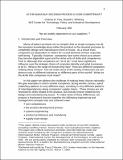| dc.description.abstract | Many of today's products are so complex that no single company has all the necessary knowledge about either the product or the required processes to completely design and manufacture them in-house. As a result, most companies are dependent on others for crucial elements of their corporate well-being. Typically, however, companies have some choice as to whom they become dependent upon and for what sorts of skills and competences. That is, although few companies can "do it all," most have significant
influence over the strategic choice of corporate identity and what businesses to be in. What is the range of choices they face? How are different companies making those choices? Can we make sense of the variety of decisions we can
observe now in different industries or different parts of the world? What are the skills that companies must retain?
In this paper we address the challenge of making these choices rationally. We give examples in which similar companies, facing similar choices, select make/buy patterns in very different ways, resulting in very different patterns
of interdependencies along companies' supply chains. These choices are not
restricted to skills related to the product, but include choices related to key
design and manufacturing issues. To make sense of these differences, we
propose a framework that ties together the following engineering and
management concepts into one coherent view:
1) core competencies
2) the product development process
3) systems engineering
4) product architecture and modularity, and
5) supply chain design. | en |
| dc.description.sponsorship | ONR and various MIT programs including Leaders for Manufacturing,
International Motor Vehicle Program, Industrial Performance Center, Japan Program, International Center for Management of Technology. | en |
